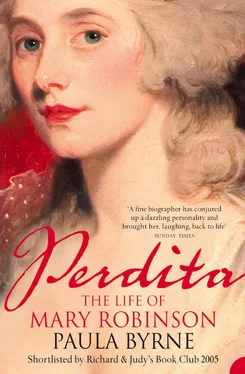Who has not wak’d to list the busy sounds
Of summer’s morning, in the sultry smoke
Of noisy London? On the pavement hot
The sooty chimney-boy, with dingy face
And tatter’d covering, shrilly bawls his trade,
Rousing the sleepy housemaid. At the door
The milk-pail rattles, and the tinkling bell
Proclaims the dustman’s office, while the street
Is lost in clouds impervious. Now begins
The din of hackney-coaches, wagons, carts;
While tinmen’s shops, and noisy trunk-makers,
Knife-grinders, coopers, squeaking cork-cutters,
Fruit-barrows, and the hunger-giving cries
Of vegetable vendors, fill the air.
Now ev’ry shop displays its varied trade,
And the fresh-sprinkled pavement cools the feet
Of early walkers. 3
She finds poetry in everything from the dustman to the ‘neat girl, / Tripping with bandbox lightly’ to the street vendor of second-hand clothes.
Mary was to experience London in its entirety, from debtors’ prison to parties given in her honour as the Prince’s consort at St James’s Palace. She became notorious for her self-promotion and her skill in anticipating the next new thing, be that in fashion or poetry. But she also grasped the very essence of urban culture in the late eighteenth century in a way that eluded Wordsworth. She knew that in order to survive and thrive in the new consumer society, she had to work to sell her wares. The literary marketplace was as crowded as the London streets and it took guts, brashness, and ostentation to make your voice heard – especially if you were a woman.
She must have felt some trepidation at meeting Garrick: ‘King’ David, the man who had single-handedly transformed the theatre world, acting on stage with unprecedented naturalism, producing behind the scenes with prodigious energy, and above all conferring on his profession a respectability it had never had before.
The 14-year-old girl was summoned to the actor’s elegant and grand new house in Adelphi Terrace, designed by the fashionable Adam brothers and overlooking the Thames. The Garricks had recently moved there and had furnished it lavishly. Mary would have entered through the large hall, with its imposing pillars, and then been shown into the magnificent first-floor drawing room, with its elaborate plaster ceiling crowned by a central circular panel of Venus surrounded by nine medallion paintings of the Graces. Garrick would have soon put her at ease with his good humour and liveliness. His wife, Eva Maria Veigel, a former dancer, was usually at his side and was especially considerate to young girls, as the future dramatist and novelist Fanny Burney testified when she visited the Garricks at their new house the same year: ‘Mrs Garrick received us with a politeness and sweetness of manners, inseparable from her.’ 4
Garrick, always susceptible to beauty, was captivated by Mary’s loveliness. Her voice reminded him of Susannah Cibber, an actress and singer he had favoured in his youth. An added attraction came in the form of Mary’s long, shapely legs, ideal for the highly popular ‘breeches roles’ that were required of actresses on the Georgian stage. In an age when women wore full-length dresses all the time, the actress who cross-dressed in boys’ clothing – as Shakespeare’s Rosalind and Viola, and in dozens of similar roles in eighteenth-century comedies – provided a unique spectacle: the public exhibition of the shape of a female leg.
Garrick’s personal interest was in no sense salacious. His faith in this young unknown was typical of his unfailing support for women in the theatre. His patronage of female actresses and female playwrights was highly unusual in a society that discouraged women from the stage and still regarded actresses as little better than prostitutes. Garrick ‘discovered’ many a young actress and gave playwrights such as Hannah More and Hannah Cowley their first break. In return these young women adored him and his wife.
He offered to train Mary for the part of Cordelia to his own King Lear in the version of Shakespeare’s tragedy that he had reworked from Nahum Tate’s Restoration era adaptation, in which Cordelia is happily married off to Edgar instead of being hanged. Garrick was now in his fifties, beginning to suffer from gout and gallstones. He was conserving his energy, limiting the number of his appearances on stage. Lear, which he had been playing since he was 25, was not only one of his most celebrated but also one of his most demanding roles. This late in his career, it was an extraordinary gamble to entrust Cordelia to a complete unknown. He and Mary spent hours preparing for her debut in the role.
But it was not all work: in the Memoirs , she draws a charming picture of them dancing minuets (Garrick was an excellent dancer) and singing the favourite ballads of the day. Her memory remained vivid: ‘Never shall I forget the enchanting hours which I passed in Mr Garrick’s society: he appeared to me as one who possessed more power, both to awe and to attract, than any man I ever met with.’ 5 She also noticed his dark side: ‘His smile was fascinating; but he had at times a restless peevishness of tone which excessively affected his hearer; at least it affected me so that I never shall forget it.’ His temper was renowned. Fanny Burney reported in her diary that Dr Johnson attributed Garrick’s faults to ‘the fire and hastiness of his temper’. Burney loved Garrick and was mesmerized by the lustre of his ‘brilliant, piercing eyes’, but she also noted that ‘he is almost perpetually giving offence to some of his friends’. 6 Others could feel irritated by his attention-seeking behaviour. As his friend Oliver Goldsmith put it, he was always natural, simple and unaffected on stage – ‘’Twas only when he was off, he was acting.’ 7
Garrick had a genius for self-publicity and was astonishingly energetic: in the light of Mary’s subsequent career, one might say that he was her perfect role model. Mary adored him and took his advice seriously. He advised her to frequent Drury Lane and familiarize herself with its practices before she made her debut. She quickly became known as Garrick’s new protégée and drew a swarm of admirers. This was Mary’s first taste of celebrity and she loved the ‘buzz’ (her term). While Hester fretted about her daughter’s reputation, Mary was confident that she could tread the thin line between fame and infamy: ‘my ardent fancy was busied in contemplating a thousand triumphs, in which my vanity would be publicly gratified, without the smallest sacrifice of my private character’. 8
Hester worried that her daughter was making too much of a stir amongst the young rakes who frequented the theatre just to flirt with the latest ingénue. She kept her eye on one man in particular. In her Memoirs Mary described him as a graceful and handsome officer – a Captain – who was very well connected, though she declined to name him. After a brief courtship, and offers of marriage, Hester discovered that he was already married. Mary was informed of the deception, but brushed it off: ‘I felt little regret in the loss of a husband, when I reflected that a matrimonial alliance would have compelled me to relinquish my theatrical profession.’ Another rich suitor came forward at this time, but, to Mary’s horror, he was old enough to be her grandfather. She had set her heart on being an actress: ‘the drama, the delightful drama, seemed the very criterion of all human happiness’. 9
She was naturally flirtatious and her beauty attracted a stream of admirers. One of her most persistent suitors was a young solicitor’s clerk, who lived across the way from her lodgings. He would sit in the window staring at the fresh-faced Mary. He was languorous and sickly looking, which would have appealed to a girl of strong ‘sensibility’. Mrs Darby’s response to the flirtation was to keep the lower shutters of the windows permanently closed. Fancying ‘every man a seducer, and every hour an hour of accumulating peril’, she sighed for the day when her daughter would be ‘well married’. 10
Читать дальше












